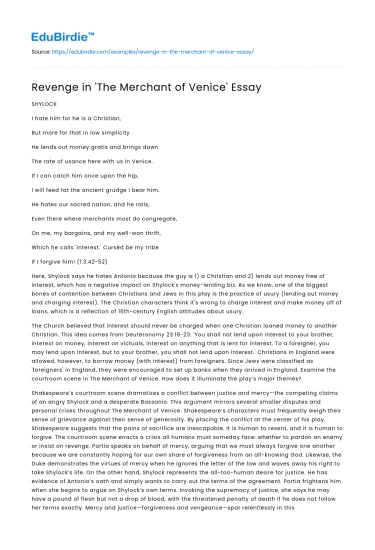SHYLOCK
I hate him for he is a Christian,
Save your time!
We can take care of your essay
- Proper editing and formatting
- Free revision, title page, and bibliography
- Flexible prices and money-back guarantee
But more for that in low simplicity
He lends out money gratis and brings down
The rate of usance here with us in Venice.
If I can catch him once upon the hip,
I will feed fat the ancient grudge I bear him.
He hates our sacred nation, and he rails,
Even there where merchants most do congregate,
On me, my bargains, and my well-won thrift,
Which he calls 'interest.' Cursèd be my tribe
If I forgive him! (1.3.42-52)
Here, Shylock says he hates Antonio because the guy is 1) a Christian and 2) lends out money free of interest, which has a negative impact on Shylock's money-lending biz. As we know, one of the biggest bones of contention between Christians and Jews in this play is the practice of usury (lending out money and charging interest). The Christian characters think it's wrong to charge interest and make money off of loans, which is a reflection of 16th-century English attitudes about usury.
The Church believed that interest should never be charged when one Christian loaned money to another Christian. This idea comes from Deuteronomy 23:19-23: 'You shall not lend upon interest to your brother, interest on money, interest on victuals, interest on anything that is lent for interest. To a foreigner, you may lend upon interest, but to your brother, you shall not lend upon interest.' Christians in England were allowed, however, to borrow money (with interest) from foreigners. Since Jews were classified as 'foreigners' in England, they were encouraged to set up banks when they arrived in England. Examine the courtroom scene in The Merchant of Venice. How does it illuminate the play’s major themes?
Shakespeare’s courtroom scene dramatizes a conflict between justice and mercy—the competing claims of an angry Shylock and a desperate Bassanio. This argument mirrors several smaller disputes and personal crises throughout The Merchant of Venice. Shakespeare’s characters must frequently weigh their sense of grievance against their sense of generosity. By placing the conflict at the center of his play, Shakespeare suggests that the pains of sacrifice are inescapable. It is human to resent, and it is human to forgive. The courtroom scene enacts a crisis all humans must someday face: whether to pardon an enemy or insist on revenge. Portia speaks on behalf of mercy, arguing that we must always forgive one another because we are constantly hoping for our own share of forgiveness from an all-knowing God. Likewise, the Duke demonstrates the virtues of mercy when he ignores the letter of the law and waves away his right to take Shylock’s life. On the other hand, Shylock represents the all-too-human desire for justice. He has evidence of Antonio’s oath and simply wants to carry out the terms of the agreement. Portia frightens him when she begins to argue on Shylock’s own terms. Invoking the supremacy of justice, she says he may have a pound of flesh but not a drop of blood, with the threatened penalty of death if he does not follow her terms exactly. Mercy and justice—forgiveness and vengeance—spar relentlessly in this climactic scene.
Shakespeare has laid the thematic groundwork for his climax by repeatedly noting the virtues of a merciful way of life. Antonio takes on a heroic stature when he forgives Bassanio’s countless debts and encourages him to find love. Portia tempers Nerissa’s severity when she says we must be merciful unto others as well as unto ourselves. Portia forgives Bassanio for leaving Belmont on the night of their engagement, putting aside her own wishes and encouraging him to help his friend. Jessica and Lorenzo repeatedly note the necessity of good humor; it is in the nature of lovers to stray and to make false promises, so we must try to laugh and see what is best in one another. Each of these characters acts as an occasional spokesperson for the mild-mannered, magnanimous approach to life.
On the other hand, several of Shakespeare’s characters crave justice in moments of weakness. Despite his constant sacrifices, Antonio becomes irritating when he seems to brood on his sense of perpetual martyrdom, and Gratiano urges him to abandon his silent grievances and enjoy his life. Long before the courtroom scene, Shylock embodies the human desire for revenge, asking why he should cooperate with Antonio when Antonio has ignored him and called him a cur. The Prince of Arragon seems absurd when he claims Portia on the grounds that he deserves her, and the message in the silver casket rebukes him for thinking that we are ever naturally entitled to happiness. In our discomfort and self-absorption, we make the error of Shakespeare’s characters and insist on justice in a patently unjust world.
By pitting mercy against justice in his climactic scene, Shakespeare suggests that everyone struggles with competing urges to complain and forgive. Shylock demands the flesh the law has promised him, and Portia argues that the world is too complex to be governed by rigid laws. Portia, Antonio, and Lorenzo all occasionally look past their own problems and behave generously, whereas other characters cannot overcome a gnawing sense of grievance and injustice. In five tolerant, effortless acts, Shakespeare shows us that we are destined to have these arguments—with others and with ourselves—every day of our lives.






 Stuck on your essay?
Stuck on your essay?

